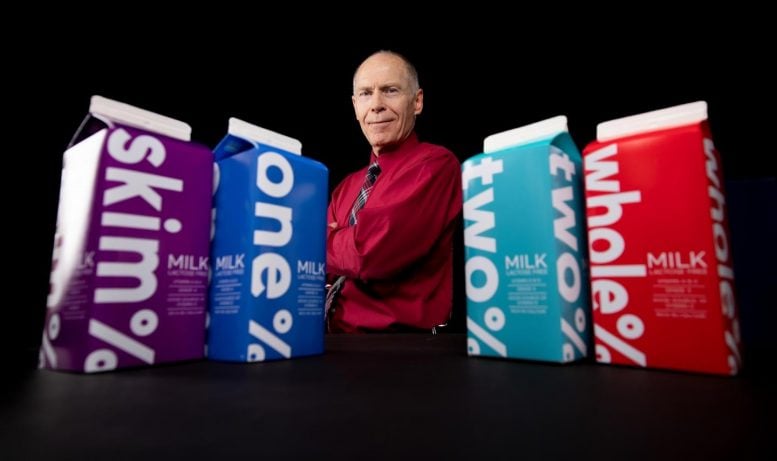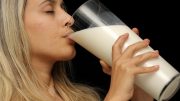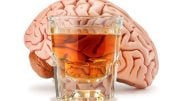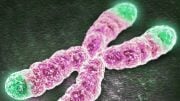
BYU professor of exercise science Larry Tucker poses with cartons of milk. Credit: Jaren Wilkey/BYU Photo
High-fat milk consumption is connected to significantly shorter telomeres.
Drinking 1% rather than 2% milk accounts for 4.5 years of less aging in adults according to a new study by Brigham Young University.
A new study shows drinking low-fat milk — both nonfat and 1% milk — is significantly associated with less aging in adults.
Research on 5,834 U.S. adults by Brigham Young University exercise science professor Larry Tucker, Ph.D., found people who drink low-fat (1% and skim) milk experience several years less biological aging than those who drink high-fat (2% and whole) milk.
“It was surprising how strong the difference was,” Tucker said. “If you’re going to drink high-fat milk, you should be aware that doing so is predictive of or related to some significant consequences.”
Tucker investigated the relationship between telomere length and both milk intake frequency (daily drinkers vs. weekly drinkers or less) and milk fat content consumed (whole vs. 2% vs. 1% vs. skim). Telomeres are the nucleotide endcaps of human chromosomes. They act like a biological clock and they’re extremely correlated with age; each time a cell replicates, humans lose a tiny bit of the endcaps. Therefore, the older people get, the shorter their telomeres.

And, apparently, the more high-fat milk people drink, the shorter their telomeres are, according to the new BYU study, published in Oxidative Medicine and Cellular Longevity. The study revealed that for every 1% increase in milk fat consumed (drinking 2% vs. 1% milk), telomeres were 69 base pairs shorter in the adults studied, which translated into more than four years in additional biological aging. When Tucker analyzed the extremes of milk drinkers, adults who consumed whole milk had telomeres that were a striking 145 base pairs shorter than non-fat milk drinkers.
Nearly half of the people in the study consumed milk daily and another quarter consumed milk at least weekly. Just under a third of the adults reported consuming full-fat (whole) milk and another 30 percent reported drinking 2% milk. Meanwhile, 10% consumed 1% milk and another 17% drank nonfat milk. About 13% did not drink any cow milk.
“Milk is probably the most controversial food in our country,” Tucker said. “If someone asked me to put together a presentation on the value of drinking milk, I could put together a 1-hour presentation that would knock your socks off. You’d think, ‘Whoa, everybody should be drinking more milk.’ If someone said do the opposite, I could also do that. At the very least, the findings of this study are definitely worth pondering. Maybe there’s something here that requires a little more attention.”
Somewhat surprisingly, he also found that milk abstainers had shorter telomeres than adults who consumed low-fat milk.
Tucker said the study findings provide support for the current Dietary Guidelines for Americans (2015-2020), which encourage adults to consume low-fat milk, both nonfat and 1% milk, and not high-fat milk, as part of a healthy diet.
“It’s not a bad thing to drink milk,” Tucker said. “You should just be more aware of what type of milk you are drinking.”
Reference: “Milk Fat Intake and Telomere Length in U.S. Women and Men: The Role of the Milk Fat Fraction” by Larry A. Tucker, 28 October 2019, Oxidative Medicine and Cellular Longevity.
DOI: 10.1155/2019/1574021








Gee, I wonder if it could have to do with the fact people drinking 1% milk are more concerned about their health and make a lot of different and healthier lifestyle choices?
I drink whole milk. Lowfat and nonfat milk remind me of cold horse semen. Disgusting.
And, how is it you know what cold horse semen tastes like?
Like many studies, it only shows correlation, not cause and effect.
Yes. But it would be odd if shorter telomeres would change taste and/or habits of milk drinkers.
Would be interesting to add organic milk to the mix. I’d imagine more fat, more absorption of pesticides, hormones. I’d expect organic to correlate with non-drinkers, then no mystery. Kinda surprised he missed it.
This is what I was thinking as well.
study shows correlation only. both journalist and researcher should emphasize this, rather than giving impression there is a likely causal relationship…. indeed, the research shows milk non-drinkers had the same [implied] negative outcome. science journalists should do better– this misleads people.
Above all they should give the context, telomeres are not a good age indicator.
As for the study the data could not be used for a casuality study. However, the relationship between fat content and telomere loss was linear so that argues that the relationship is significant. But the overall study target is weak (bad indicator).
I felt bad reading both of these comments. To me, this seems out of place in such a public forum. thanks
This specific comment was a reply to an earlier series that seemed offensive — which has since been edited out. Editor: please remove my second listed comment if possible. thank you
Less aging doesn’t sound like a desireable result to me. You could have zero aging if you die at 25…
@Zaremba, you need to warm it up, much better.
On more serious note, yes, what about people who drink 1% milk? study after study shows that lowfat is not necessarily healthier so are the 1%-ers just more likely to follow health fads? Or is there something else in their diet that’s better regardless of the fat in their milk?
At 70, a longterm AIDS survivor with kidney damage, a heart attack, DVT in both legs and emphysema (never a smoker) and yet generally guessed to be much younger, I think I’ll continue to drink whole milk. So far it is the least of my worries!
What about cheese, sour cream and other dairy product?
Now how does cheese play into this?
Telomere length is not an indicator of aging, but of age related diseases; length can be increased (and in some species that is the basic trend) [ https://en.wikipedia.org/wiki/Telomere ]. Arguably methylation is a better indicator of general age changes (changes protein expression, and is hard to reverse).
I am 77 this year. I have tried various grades of milk and found that 1% lactose free tastes best to me. I still drink one cup of decaf with milk/day mainly for the taste. My health has been good until the last 3 years when I suffered rotater cuff degenration, tear and repair. Then when I started to work out again, my right knee (previously repaired) needed replacement. Then I passed out from lack of sleep, fell in a pile, and fractured L1 and L4. Now we are under covid-19 lock down so getting back to exercise is not very doable. This is an interest study with lots of evolutionary questions that will be grist for the mill of all the youngs coming along.